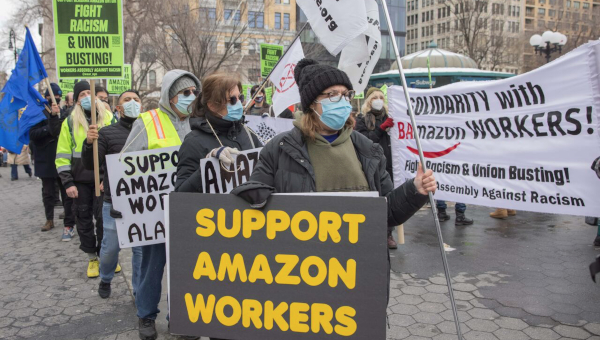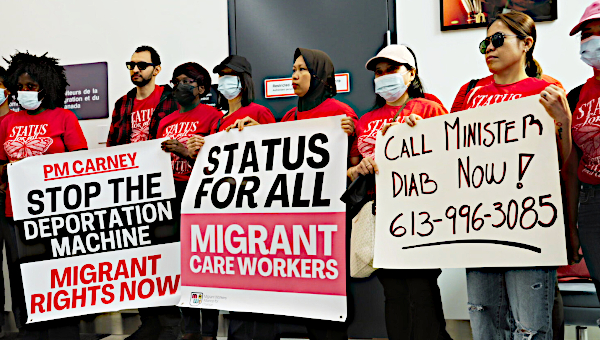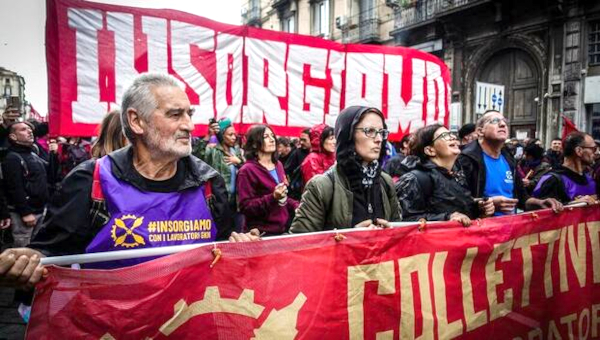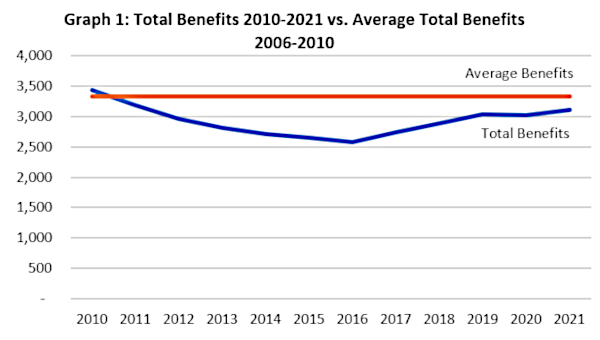Factory Occupation Saves Jobs
A 12-hour occupation by workers at a Chicago factory on February 23 won an agreement that will save workers’ jobs for at least three months so they can seek other ways to keep their plant open and producing. The factory on the northwest side of the city is the former Republic Windows & Doors plant, where union members occupied for a week in December 2008 after the previous owners and their financial backers, Bank of America, announced without warning that the factory was closing.
That struggle electrified the local and national labour movement, causing an outpouring of solidarity that stunned the bosses and bankers. After six days of the occupation, management caved. A new owner who promised to continue operations took over, and the Republic factory became Serious Energy.
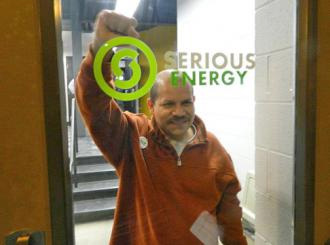
On Thursday afternoon, the same workers whose courage three years ago inspired people around the country again heard that the next day would be their last day of work. They again turned to the tactic of the great labour struggles of the 1930s and occupied the factory.
Proud Union Members
But this time, they won a concession that saves their jobs for now before the dawn of the next day. Around 2 a.m. – with snow flurries starting to fall that brought back memories of the 2008 occupation – the 60 members of United Electrical Workers (UE) Local 1110 who remained inside the plant proudly marched out, fists held high, after an agreement was reached.
UE Local 1110 President Armando Robles, who led the 2008 occupation, told the crowd of supporters who assembled as soon as they heard about the new takeover: “We got more than we expected. Now we have 90 days to work and try to get somebody else to buy the company, with the possibility of the workers run it under our own banner.”
Among the crowd outside were about a dozen workers who had to leave the plant after the occupation began, many for family reasons, and were blocked by police from going back in to rejoin their brothers and sisters.
One of the workers kept outside, Apolinar Cabrera, who has worked for Republic Windows/Serious Energy for 20 years, described how the occupation developed:
“This morning, the union and the company met. We felt then that something was wrong. They came back to the plant after the meeting at 2 p.m. with the owner’s lawyer, and they told us that tomorrow would be the last day we could work – that the plant would be closed. Then the union and the workers decided we would occupy once again, reviving the actions we took in December 2008. And here we are.
“I had to leave early to pick up my children, so now I’m supporting from here, on the outside, and I’m seeing how people are arriving to show solidarity, just like it happened in 2008. That gives us more courage to keep up the fight.”
Many of the more than 100 supporters who gathered outside the factory had brought food with them, but police – who were heard to say during the evening, “They won’t last long this time” – would not allow it to get to the occupying workers. But pressure from outside and inside mounted, and around 8 p.m., the police gave in. Leah Fried, a UE organizer, came outside to update the crowd:
“They are letting food in, which is good news, because we haven’t eaten for a long time, and we’re very grateful for all these amazing supporters. There was a moment in there when we weren’t sure we would be able to stay, but having you here made all the difference. Let’s tell people all over Chicago that enough is enough, we have to fight for jobs, we have to fight for justice.”
Hi Stakes
Fried explained the stakes to reporters gathered outside:
“The company’s intention was to close the factory immediately and not sell the place. Our only demand is that we be given the chance to save these jobs. What we want is time – time to find a buyer or even to make it possible for workers to buy this place themselves and run it as a worker-run enterprise. We’ll stay here as long as it takes. We did it once before, and we’ll do it again.”
Inside, Armando Robles described the situation via cell phone:
“Between 60 and 70 workers were inside the plant, refusing to leave. At the beginning, the police threatened to remove us, but thanks to Occupy Chicago and the comrades from the community, and also the media that showed up, this gave us strength.”
“The police threatened to remove us, but thanks to Occupy Chicago and the comrades from the community, and also the media that showed up, this gave us strength. … We know that it’s illegal to occupy, but the two times we’ve done it, we have come out with success.”
Robles said the company came to the morning meeting with union representatives acting very arrogant. Management eventually announced that the plant would close the next day, and that workers would be paid for 60 days, as required under the Worker Adjustment and Retraining Notification Act, but in increments every two weeks.
“We didn’t think that was a deal we could take,” Robles said, “because after tomorrow, if we left the factory, we wouldn’t be able to obtain what we can today, with us inside. The goal of the workers is to reopen and run this company, with or without bosses.”
Outside, Apolinar talked about his disappointment with a management that had been celebrated in 2009 by Vice President Joe Biden and other federal and state officials as an example of an employer who cared about saving jobs:
“In 2009, they brought the Vice President of the United States and [then-Mayor Richard M.] Daley and other politicians and businessmen to show how a plant that had closed just a few months before was working again. They wanted to show the world their commitment to save jobs, open business and reactivate the economy.
“And now they’re doing the same as the previous bosses, who don’t feel for the people working in the plant who put their time, effort and everything into it so this can grow as a company. Instead, they tell you that today is your last day, and that’s it. They don’t care.”
In the early morning hours, after the occupying workers had marched out, Robles talked about what might come next:
“For now, we have an agreement not to occupy the plant. They told us it is illegal. But it is illegal what they have tried to do to us, too – twice already. We know that it’s illegal to occupy, but the two times we’ve done it, we have come out with success. So if we have to do it again, well…”
Meanwhile, Apolinar was thinking about what it would mean to keep the factory open as a worker-run enterprise:
“Two years ago, after the previous occupation, I read a book about Argentina, Sin Patrón, that talks about how workers in shut-down factories formed cooperatives to keep their plants working. I was talking to a co-worker that we have that opportunity now. Obviously, we need support – perhaps a bank or someone to back us financially – but we have the equipment, we have the labour force, and we have the desire to keep this plant open and producing to bring even more people back to work.”
As for now, the members of UE Local 1110 are proud of what they did in defense of their jobs – and see the occupation as something that can help turn the tide for other workers facing the threat of unemployment and employers’ attacks on their living standards. As Armando Robles put it: “The only way that we’re going to save jobs is to duplicate this occupation – here in the United States and the world over.” •
This article first appeared at the Socialist Worker.


